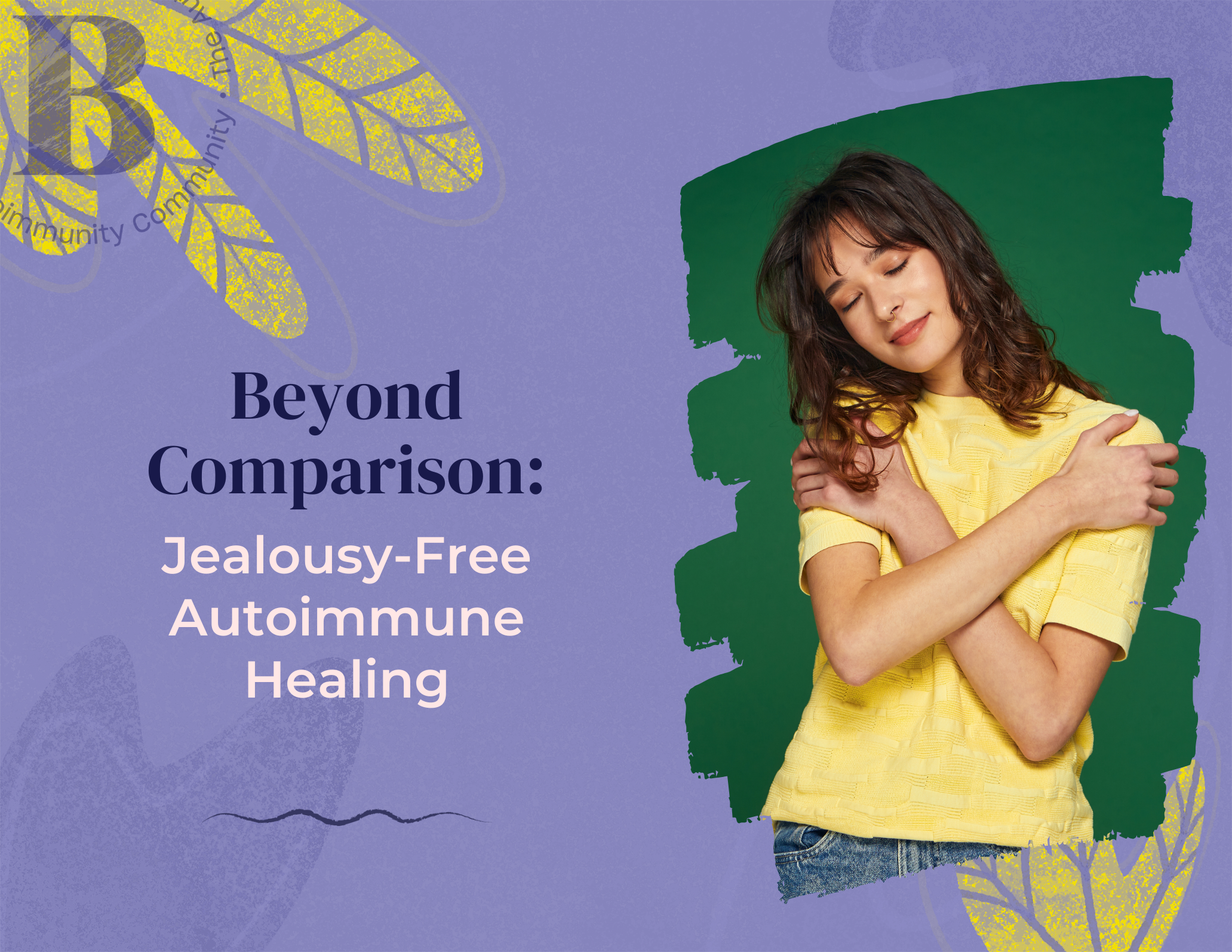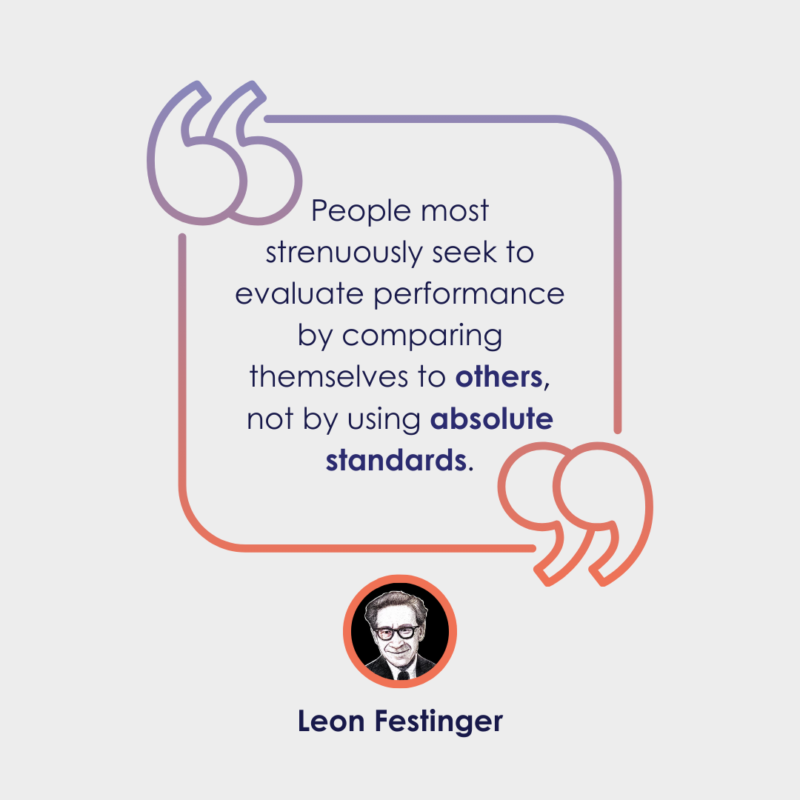
Beyond Comparison: Jealousy-Free Autoimmune Healing
Embarking on the journey of autoimmune healing can feel like navigating a maze with no clear end in sight. Managing symptoms, seeking treatments, and adjusting lifestyles are part of the path. Amidst this struggle, jealousy often creeps in, especially when others seem to progress faster or handle their condition with ease.
Addressing jealousy openly and compassionately is crucial. By acknowledging these feelings, we can transform them into motivation instead of letting them hinder our progress.
Let’s explore how to navigate these emotions and create a supportive, jealousy-free environment for our autoimmune healing journey.
Understanding Jealousy in Autoimmune Healing
Ahh, jealousy—an emotion we all know too well.
It’s that pang in your chest when someone else seems to have it better, especially when you’re dealing with something as challenging as an autoimmune disease.
In the context of autoimmune health, jealousy often rears its head when we see others recovering faster, managing their symptoms more effectively, or simply having more “good” days.
Despite its ugly head, jealousy is a natural and common response.
It’s rooted in our innate desire to compare ourselves to others.
It’s not just about wanting what someone else has; it’s also about feeling inadequate or left behind.
So, when your friend with a similar diagnosis starts bouncing back while you’re still struggling to get out of bed, know that it’s only human to feel a twinge (or a tidal wave) of jealousy.
This feeling can be exacerbated by social media, where people often share their highlights, making it seem like everyone else’s healing journey is a walk in the park but yours.
Consider these common triggers for jealousy in autoimmune healing:
1. Seeing Others Recover Faster: You’ve been following your treatment plan religiously, yet your progress feels snail-paced. Then you see someone else, perhaps in a support group, hitting milestones you haven’t even approached yet. It’s like watching someone else’s plant grow lush and green while yours seems to wilt despite all your care.
2. Managing Symptoms Better: You hear stories of people who have seemingly mastered their symptoms. They’re out there running marathons while you’re struggling to manage a short walk. It’s easy to wonder why your efforts aren’t yielding the same results.
3. Having More Support: Some people have a strong support network that makes their journey seem easier. When you’re facing your health battles mostly alone, seeing someone else with an army of supporters can spark feelings of envy.
4. Living a “Normal” Life: The sight of others enjoying what you might consider normal activities—like attending social gatherings without fear of flare-ups—can be particularly triggering. You might find yourself longing for the days when you didn’t have to plan your life around your health.
Recognizing that jealousy is a natural part of this process can be liberating.
It’s not about suppressing these feelings but about acknowledging them and finding healthier ways to cope.
Reflect on what specifically triggers your jealousy and use that as a guide to what you might need more of in your life—be it support, a sense of progress, or simply a break from comparisons.
Remember, everyone’s journey with autoimmune healing is unique, and your path is valid, even if it looks different from others.
Feelings Are Valid
When managing autoimmune healing, recognizing that feelings of jealousy are valid is crucial.
Comparing your progress to others, especially those seemingly healing faster, can trigger jealousy.
But feeling this way doesn’t make you a bad person; it makes you human.
Here’s what one of our members has to share about feeling jealousy and how they have come into terms with this common emotion:
Jealousy often stems from frustration and a sense of unfairness.
Imagine running a marathon and seeing someone else finish effortlessly while you struggle to keep pace.
It’s natural to feel envious, but remember, each runner has a different journey, and so do you.
By acknowledging and accepting your jealousy, you don’t give it power over you. Instead, you take the first step toward emotional healing. Embrace your humanity and understand that these feelings are part of the process. Facing them head-on allows you to grow.
The Psychological Trap of Comparison
Psychologically, this habit taps into the “comparison trap,” rooted in social comparison theory.
Psychologist Leon Festinger noted that humans compare themselves to others to evaluate their progress. While sometimes motivating, it often backfires with chronic illness.

In the comparison trap, every milestone someone else reaches feels like a reminder of your struggles.
It’s like being stuck in a maze where everyone else finds the exit while you’re still lost.
This can decrease self-esteem and increase anxiety, making healing even more challenging.
Breaking Free from the Comparison Cycle
To break free, first recognize when you’re comparing yourself to others.
- Ask, “Is this helping me?” If not, redirect your focus.
- Celebrate your unique journey and your progress, no matter how small.
- Engage in positive self-talk and surround yourself with supportive people.
- Embrace the mindset that everyone’s healing journey is different, and that’s okay.
Ditching the comparison game lets you be present in your healing journey.
It opens space for self-compassion and patience, crucial for true, lasting recovery.
Strategies for Cultivating a Compassionate Perspective
1. Practicing Self-Compassion:
Self-compassion is about treating yourself with the same kindness and understanding that you would offer to a friend in a similar situation.
It’s not just a feel-good buzzword; it has real benefits like reducing anxiety, boosting resilience, and even aiding in physical healing.
So, how do you start practicing self-compassion? Here are a couple of techniques:
- Self-Kindness: Instead of beating yourself up for what you can’t do, celebrate what you can. Remember that everyone has limitations, and it’s okay to acknowledge yours without judgment.
- For instance, if you’re having a flare-up and can’t participate in an activity, remind yourself that resting is a necessary part of your healing process. Speak to yourself the way you would comfort a friend, with gentleness and support.
- Mindfulness: Being mindful means staying present in the moment and accepting it without judgment.
- A simple mindfulness exercise is to take a few deep breaths and focus on the sensation of the air entering and leaving your body. This can help ground you and create a sense of calm.
Practicing self-compassion doesn’t mean ignoring your struggles or pretending everything is fine. It’s about recognizing your pain and responding to it with care and understanding.
This shift can be incredibly empowering, helping you to navigate the ups and downs of autoimmune healing with grace and resilience.
2. Setting Personal Goals:
When it comes to autoimmune healing, setting personal goals is key.
Imagine you’re at a park, and everyone is moving at different speeds.
Comparing your pace to others can be disheartening. Your healing journey is uniquely yours, so find your own rhythm and celebrate every bit of progress, no matter how small.
3. Embrace Realistic and Personal Goals
- Focus on realistic, personal goals by listening to your body’s unique needs. Forget about others’ journeys; yours is what matters.
- Break down your goals into manageable steps. Instead of aiming to eliminate all symptoms in a month, aim to reduce stress by practicing daily mindfulness.
Tips for Creating a Personalized Healing Plan
Creating a personalized healing plan requires introspection and self-love. Here are some tips to help you:
- Listen to Your Body: Track your symptoms and progress in a journal. Understanding your body’s responses helps you know what it needs.
- Be Flexible: Adjust your goals as needed. Flexibility lets you adapt without feeling like you’ve failed.
- Set Small, Achievable Goals: Start with milestones within reach. If improving your diet, add one new healthy food each week to build sustainable habits.
- Celebrate Wins: Every step forward is worth celebrating. Stuck to your meditation routine for a week? Celebrate it!
- Seek Support: Don’t go at it alone. Join support groups, talk to friends, or seek guidance from healthcare professionals. Sharing your journey can provide motivation and new perspectives.
4. Joining a Supportive Community
Healing from an autoimmune condition can feel like an uphill battle, but you don’t have to climb it alone.
Surrounding yourself with supportive and understanding individuals can make a world of difference. It’s like having a cheerleading squad ready to lift you up, offering support, insights, and shared experiences that ease your journey.
Finding Your Tribe
- Local Support Groups: Check hospitals, wellness centers, and libraries for local meetings. These gatherings provide a safe space to share experiences and learn from others who understand what you’re going through.
- Apps: Apps like BrightlyThrive connect you with people worldwide who share your journey and communities offering 24/7 support. They also provide resources like articles, personal stories, access to community events and wellness tools, making them a one-stop shop for support.
- Workshops and Classes: Join workshops, wellness retreats, or regular yoga and meditation classes. These environments foster a sense of community and shared purpose, helping you meet like-minded individuals focused on health and well-being.
- Volunteering: Volunteer for organizations related to autoimmune diseases. Whether it’s organizing events, participating in fundraising walks, or helping at health fairs, these activities build your support network and give you a sense of purpose.
Joining a supportive community is about more than just finding people to talk to; it’s about creating a network of understanding, encouragement, and shared wisdom.
These connections turn the isolating experience of dealing with an autoimmune condition into a journey filled with compassion, empathy, and mutual growth.
Reach out, connect, and let the healing begin with the power of community by your side.
Final Thoughts
Understanding and addressing jealousy is vital in autoimmune healing.
Jealousy can derail our progress by fostering unnecessary stress and comparisons with others. Recognizing this is the first step to breaking free from its grip.
Healing is a personal journey, unique to each of us.
Celebrate your achievements and view setbacks as learning opportunities. Focus on your progress and well-being, rather than comparing yourself to others. Every step you take is a victory, no matter how small.
Move forward with confidence and self-love, knowing each step is a testament to your strength and resilience.
For community support and expert guidance on a jealousy-free autoimmune healing journey, download the BrightlyThrive App today. Join a community that understands and supports your unique path to wellness.
Resources
P., & P. (2024, February 6). Impact of Self-Esteem on Autoimmune Diseases: Mind-Body Connection. Maggie Yu MD, IFMCP – Transform Your Health.
Driskell, J. (2015, August 27). 3 ways to turn jealousy into motivation and self-acceptance. Psychology Today.
Firestone, L. (2018, October 17). The six faces of jealousy. Psychology Today.
Tandon, A., Dhir, A., & Mäntymäki, M. (2021, April 12). Jealousy due to social media? A systematic literature review and framework of social media-induced jealousy. Internet Research, 31(5), 1541–1582.
Godreau, J. (2023, October 20). The Psychology of Comparison: Why We Do It and How to Stop. Mindful Health Solutions.
Escaping the Comparison Trap: How to Stop Comparing Yourself to Others. (2023, December 27). Newport Institute.
Gordon, S. (2020, November 30). Self-Compassion Makes Life More Manageable. Verywell Mind.
How to focus on yourself more and prioritize your own needs — Calm Blog. (2024, February 8). Calm Blog.
Adaptability: Definition, Examples, & Tips. (n.d.). The Berkeley Well-Being Institute.
(2023, December 11). Social Superpowers: How Connection Fuels Your Healing Journey! BrightlyThrive.
Leahy, R. L. (2008, May 19). Jealousy is a killer: How to break free from your jealousy. Psychology Today.
TAGS:
CATEGORIES:







